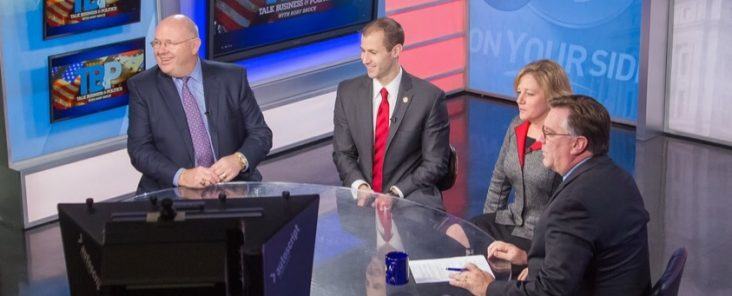2018 executive wish list includes better healthcare, more jobs and higher-skilled workforce
by January 28, 2018 9:48 am 809 views

As part of Talk Business & Politics “2018 State of the State” magazine, three Arkansas executives offered their insights on the upcoming year and their expectations.
Former Deltic Timber CEO Ray Dillon, Arkansas Children’s CEO Marcy Doderer, and Arkansas Economic Development Commission executive director Mike Preston participated in a roundtable discussion in early January. All three executives shared thoughts on workforce, economic development, and the events of 2017 that will shape 2018. Additionally, they were asked what to watch for in the new year.
Dillon said regulatory relaxation that would be considered “appropriate” would be the top of his wish list for the new year.
“That continues to stimulate capital investment, faster approval of projects, those type of things at the local level. I think hopefully incoming Chairman Powell at the Federal Reserve will bring about relaxed regulation of our community banks and that will stimulate our community banks and have them more active hopefully, which will create investment in our rural communities and be better supported by our community banks,” he said.
Dillon also touted labor investment and immigration reform as crucial to filling a looming jobs gap.
“We continue to have a need for construction workers throughout the country, but also in Arkansas. All the projects that we’re talking about need workers, and construction workers being one of those. So, I would hope we would see something along immigration policy that would be favorable as far as providing the labor resources that are needed to be able to accomplish the things we’ve talked about today,” Dillon said.
Doderer, who leads the Arkansas Children’s health network, discussed a variety of policy and financial challenges facing the industry. Arkansas Children’s is growing with a number of new initiatives, but Doderer cautioned that a larger national debate on children’s health was important to building a workforce to meet future needs.
“I think top of my wishlist is that as both the federal and the state conversation around health policy for kids or health policy in general takes place, that we can keep children as part of that conversation, that the politics of healthcare doesn’t get lost in speaking only to the aged or to the disabled, but that we can carve the kids out, talk about coverage, access, benefits for kids separate and apart from financing of the overall healthcare system. That’s my wish. Put children first. Invest in them,” she said.
Doderer contends that healthier children and improving Arkansas’ metrics on child health will result in a stronger future workforce.
“If we can work together on improving how healthy our children are, we actually feed that workforce over the next decade and further. Healthy children learn better. It takes a healthy child. So, if we can keep the young kids healthy, prepare them well when they hit kindergarten and on, which is really kind of at a core of what we’re trying to do as a child health system, then we actually can produce the kids coming out of high school and into college to fill our workforce needs into the future,” she added.
Preston said his 2018 wish list includes infrastructure spending to continue to stimulate the economy. With Arkansas having a strong backbone of steel manufacturing, the payoff from an infrastructure boost could lift a big part of the Delta.
“I think it would be great if we see an infrastructure bill passed at the federal level. And Ray [Dillon] alluded to some of the jobs that we’ll need in the construction industry if such a bill is passed, but what does that mean to our steel industry in Arkansas and all the industries that support what an infrastructure bill would mean to our state? So, I’d love to see something passed there and what that translates to into our state,” Preston said.
“Ultimately, I want to make sure that we as a state continue to grow, that our GDP continues to grow. We want to make sure that our wages are continuing to rise and that we’re more competitive,” he added.
Watch the full roundtable conversation in the video below.
